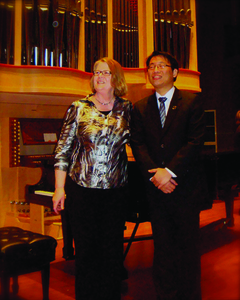

Maria Niederberger with Chih-Long Hu, piano, at Society of Composers National Conference in Columbia, S.C.
Maria Niederberger is a professor of music theory and composition at East Tennessee State University and serves as interim chair of the music department during the 2012-13 academic year.
A contemporary classical composer, she says "I find the chronological course of a composition to be crucial.
The flow should be carefully structured by contrasts and accents, and supported by modulations of various kinds. To put it this way: I construct and deconstruct sounds. Seen from this perspective, my composing compares much to the work of a sculptor: by creating lengths, depths and heights I create dimensionality."
One of her favorite compositions has a regional connection. "In 2010 my ETSU colleagues oboist Aryn Sweeney, French horn player Jeffrey Whaley and pianist Chih-Long Hu asked me to write a trio for oboe, horn and piano for their Trifecta Trio. As you can imagine, this is not a common instrumentation, and I loved the challenge." The piece, "A Dash of Color," was performed locally, on tour at four different music schools and will be out on CD soon.
She is working on two choral projects. One is for the ETSU vocal ensemble Ten Times A Lady with the addition of a tenor solo voice for David Godsey. It is intended for the group's upcoming trip to England. The second project is intended for lyric soprano, Judith Imhof and her youth choir in Switzerland. Entitled "The Heart has Many Doors," after Emily Dickinson, it will premiere in May 2013 in Geneva and be recorded shortly afterwards.
Her works have been performed in Canada, Rumania, Finland, Switzerland, Korea, China, Albania, England and in the United States.
Neiderberger sees performers as her most important collaborators. "In my composition classes, I make it a requirement for my students that their newly written works receive a live performance in a Student Composers' Concert at the end of each term. The students are responsible to organize performers and rehearse their new pieces with them. I find that this is an important way for a beginning composer to ground his or her musical imagination. He or she also learns to collaborate with performers in an effective and professional way."
Her own teachers were a huge inspiration. "Without them, I would not have been able to grow as I did. My first teacher was Richard Swift at the University of California Davis. He helped me build my self-confidence as a composer and encouraged me to apply to graduate school as a composition student. I also studied with Don Martino at Harvard, where I was an invited guest for a year. He taught me many new ways of listening and thinking. At Brandeis University I was instructed and guided by Arthur Berger, Martin Boykan and Allen Anderson. All of them accomplished composers who shared many hours of musical wisdom with us students, for which I am very grateful. Personally, I love and listen to all kinds of music from different periods and countries. Very close to my heart are some 20th-century composers because of the originality of their musical thinking."
A violinist herself, she believes that composers should first be performers. "Composition is not for dabblers, but a teacher can encourage a student," she says. "Every composer should first have been a serious performer for a considerable amount of time, so that mind and body feel and know music. Being a performer is the best way to hear and absorb important musical works in childhood and early adulthood. I also think it is important for young musicians to hear professional performances and participate in ensembles. Fortunately there are many dedicated music teachers, choirs for children and youth, youth orchestras, and other performance groups in our area. If a child wishes to write music, encourage him or her. Don't worry if it sounds like something he or she has performed. We all learn by imitation. Originality is a much later, more complex stage of development."
Neiderberger tries to create performance opportunities for their works. "I feel like I owe it to my fellow composers. I remember what an important validation it was for me in my early stages to be an invited composer in an important music festival."
Her works have been featured in numerous music festivals, congresses and international concerts. She is the recipient of the Miriam Gideon Prize for her song cycle "Full Pockets." The Kiev Philharmonic in Ukraine recorded her "Movement for Violin, Harp, and Orchestra." That same orchestral piece was accepted for performance at the International Congress on Women in Music Congress in Beijing, China. Niederberger has fulfilled commissions for well-known contemporary ensembles, collaborated with performers and received numerous scholarships, fellowships and grants, and served as a resident artist.
"My style is both complex and accessible and has evolved over time," she says. "To me every live performance of my work is a wonderful highlight that makes me feel alive and validated. I am so very grateful to all the accomplished performers, who have and continue to encourage me to write new works."
To listen to the works of this composer, visit: www.maniederberger.com.
>> Emory composer featured in major AIDS benefit.
>> Back to the main story.